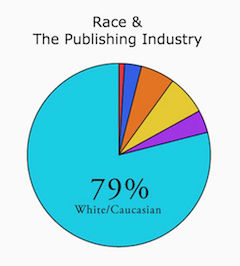

* denotes required fields
YOU WILL RECEIVE PERIODIC UPDATES FROM COLOROFCHANGE.ORG. YOU MAY UNSUBSCRIBE AT ANY TIME.

Unless the publishing industry makes a concerted, well-resourced effort to lower barriers that keep out minorities, the status quo will never change. Participating in voluntary diversity surveys or pledging to pay more attention to racial demographics is only an acknowledgement of the diversity crisis. Large publishing institutions should fund initiatives which foster inclusion and create opportunities for authors, reviewers, and editors of color to thrive within the industry.
This is the letter we'll send to the “Big Five” major publishing houses - Penguin Random House, Macmillan, HarperCollins, Hachette and Simon & Schuster – to demand that they establish annual publishing internships specifically for students of color, with stipends to cover housing and cost of living.
To the CEOs of Penguin Random House, Macmillan, HarperCollins, Hachette and Simon & Schuster
We, the undersigned, are writing on behalf of the Black community, which has long supported the publishing industry despite being shut out of it. College-educated Black women are the group most likely to read books in the U.S., and Black people read more of every type of book. People of color make up 37% of the US population. The publishing industry cannot continue to shut out and ignore the literary interests of communities of color.
Black authors, reviewers, and editors are being shut out of the publishing industry. Despite pledges and commitments from the most influential institutions to rectify this imbalance, little progress has been made. The 2015 Diversity Baseline Survey, conducted by Lee & Low books, shows just how racially homogeneous the publishing industry is. 79% of publishing and review journal staffers are white. A full 86% of executives are white. The dearth of racial inclusion within the publishing industry is reflected in the books that are accepted, produced, and sold. Only 10% of children’s books published since 1994 have been by, or about, people of color.
Major publishers have been historically averse to publishing books by or about Black individuals, averaging fewer than four African-American biographies a year. Journalism outlets like the New York Times and NPR regularly publish reading lists comprised almost exclusively of white authors. In majority non-white cities like New York, more than 60% of the cultural sector, which includes museums, theaters and other organizations, are white. And lack of editorial insight into sensitive historical and cultural issues can lead to harmful, ignorant books by white authors being published despite protest from Black communities.
The reality is that people of color often come from low-income backgrounds and have less access to professional opportunities or mentorship networks within the publishing industry. Unless the publishing industry makes a concerted, well-resourced effort to lower barriers that keep out minorities, the status quo will never change. Participating in voluntary diversity surveys or pledging to pay more attention to racial demographics is only an acknowledgement of the diversity crisis. Large publishing institutions should fund initiatives that foster inclusion and create opportunities for authors, reviewers, and editors of color to thrive within the industry.
There have been myriad discussions on the necessity of diversity, on the importance of inclusion, on the value of equitable racial representation in not just publishing, but every industry. But we have come to a point where those words and sentiments must be matched with actions. When presidential candidates feel comfortable spewing hateful rhetoric to their supporters, it is a sign that all of us must do more to fight back against ideas and beliefs that divide or endanger people of color. Books shape our perceptions, give us insights into different experiences, and teach us lessons that we carry our entire lives.
Will you support a future that recognizes and values the literary voices and talents of Black people and people of color?